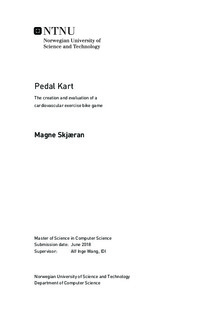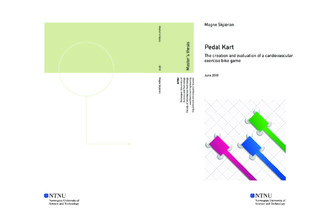| dc.description.abstract | Lack of exercise is a serious issue in modern society, with video game players being especially at risk. Overweight and obesity is trending upwards, and sedentary lifestyles significantly contribute to this trend. Some games, known as exergames (exercise games), now involve physical exertion in their gameplay in order to provide exercise during a traditionally sedentary activity. However, most such games do not appeal to people who base their lifestyle around video games, but rather to more casual players. More work should therefore be put into exergames that are likely to appeal to this group of people. Given the length of gameplay sessions such gamers put in, exergames appealing to them have the potential to make more of a difference than exergames appealing to more casual audiences.
This report investigates what factors are key to creating an exergame that both provides useful exercise, and also keeps the player engaged for a long period of time. It does so by summarizing and building upon previous exergames, both academic and commercial, as well as existing research into exercise, exergames, and what makes games enjoyable.
Based on this research, the report outlines different elements and design principles that help make an exergame effective and enjoyable, as well as design constraints given the need for exercise as a component of gameplay. It further investigates the design considerations necessary when developing an exergame for an exercise bike.
Grounded in the research and the design principles outlined, a game design for a game called Pedal Kart was created based heavily on the commercially successful game Mario Kart. A prototype was then created based on the design, focusing on the functionality supporting short to mid-term enjoyment, while not including functionality likely to only affect long-term enjoyment.
The prototype was tested across three sessions on four test participants to determine whether Pedal Kart provides sufficient exercise, and is enjoyable in the short to mid-term. The results of the experiment were positive; the test subjects experienced a high degree of physical exertion, enjoyed the game, and claimed it made it easier for them to exercise than it otherwise would be. The limited scope of the experiment makes applying these results to a wide audience difficult, but do strongly support further investigation of the game in either a research setting or a commercial setting. | |

